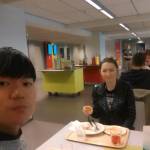Our 6th meeting we started with dinner at TAMK main campus cafe.
I asked Ssong is it easy for him to eat with fork and knife and he said that he still is not used to it.
I can imagine how difficult it will be to me, when I go to South Korea for an exchange program, as I can use chopsticks, but still I do not feel comfortable when eat with them.
On our 6th meeting we decided to revise all the Korean words I learned some months ago.
To my regret I really forgot quite many of them. Ssong found it funny that I remember some random words, though some very common words are successfully forgoten by me.
Even for me it was strange that for example I remembered how to say “expensive” 비싸다(bi-ssa-da), though I didn’t remember “cheap” 싸다(ssa-da).
Also I taught Ssong, that he can easily learn Finnish word “ilta” (evening), as in Korean
읽다(il-ta) means “to read”.
I really think that the most difficult part in studying Korean is learning new words, as to me sometimes they all sound the same e.g.
쓰다 (sseu-da) “to write” or 싸다 (ssa-da) “cheap”, or 시다(si-da) “sour”. So sometimes I just cannot remember some words, as they all sound similar to me.
Then we again practiced colours and, to my and Ssong’s surprise, I remembered most of them 🙂
Then we practiced English and the topic of our meeting was the usage of the prepositions “in”, “on” and “at”, as I had already promised before that I would explain them to him.
It was a very difficult topic for HyunSsong, since in the Korean language they don’t have such prepositions. Particularly, he couldn’t understand the difference beetwen “in” and “at”. So I explained to him that if you say “I am at school” it means you are somewhere within the territory of the school, but you can be located inside or outside of the building or somewhere nearby, etc. However, when you say “I am in school”, that means specifically inside the building. So with that said, I believe he now knows the difference. A similar mess troubled his head in regards to the usage of prepositions in terms of dates. For example: on Monday, but in spring, on the 6th of May, but in May.
It seems that he learned the main rules I explained to him and told me about his plans for summer vacation and even used all those prepositions.
I think it was a good idea to practice these prepositions. Especially, considering that before it didn’t even cross my mind that some people may not be aware of in which situation they should use them.


Comments